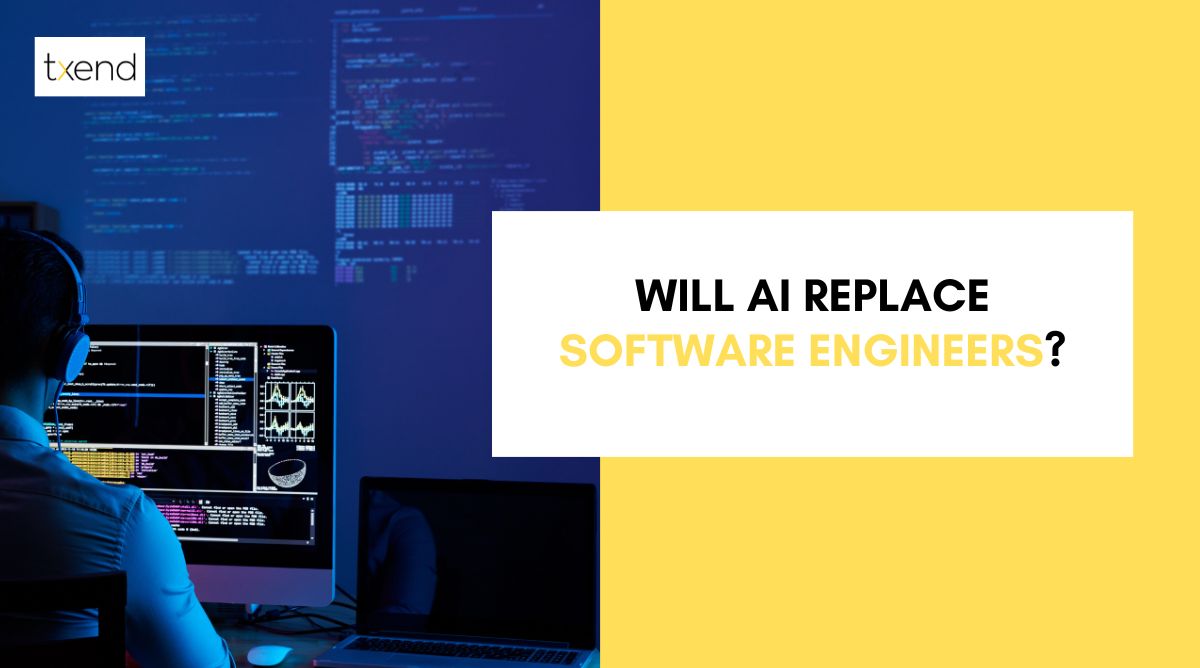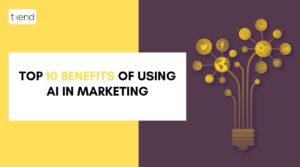Will AI replace software engineers? This is a question that is on the minds of many people in the tech industry. On the one hand, artificial intelligence (AI) is developing more and more, and it can now automate operations that were previously believed to be the sole purview of humans.
However, software engineering is a challenging and innovative subject that calls for a strong foundation in computer science as well as problem-solving abilities.
Will AI Replace Software Engineers?
In this article, we will explore the question of whether AI will replace software engineers. We’ll look at the state of AI technology today, talk about the possible advantages and disadvantages of developing software using AI, and see how software developers may get ready for AI’s future.
Key Takeaways
- AI aids software engineers in automating tasks, optimizing code, and developing intelligent systems for diverse applications.
- AI impacts software engineers by enabling automation, improving efficiency, and fostering innovation in software development processes.
- Advantages: Increased productivity, automated tasks. Disadvantages: Potential job displacement, complex implementation challenges, ethical considerations in decision-making systems.
- The future entails collaborative AI-human software development, enhanced automation, and the integration of AI-driven solutions across diverse software engineering domains.
Artificial Intelligence (AI) and Software Engineers
The goal of artificial intelligence (AI), a branch of computer science, is to build intelligent agents, or systems with the ability to think, learn, and act on their own. AI research has been incredibly successful in creating efficient methods to address a variety of issues, from diagnosing medical conditions to playing video games.
Software application design, development, testing, and maintenance are within the purview of software engineers. Utilizing their understanding of engineering principles and computer science, they develop software that satisfies user needs.
Will AI replace software engineers?
In the near future, it seems doubtful that artificial intelligence would totally replace software programmers. Some of the work done by software engineers, such writing code and debugging programs, can be automated by AI.
However, AI still lacks the creativity and problem-solving skills that human engineers possess. Software engineering often involves designing new and innovative solutions to complex problems. This calls for a high degree of critical thinking and judgment, which AI cannot easily replace.
That said, AI is likely to play an increasingly important role in the software engineering field. AI-powered tools can help software engineers to be more productive and efficient.
For example, AI can be used to generate code snippets, identify bugs, and optimize programs. Software engineers who can effectively use AI tools will be in high demand in the coming years.
Influence of Artificial Intelligence in software engineers
In the US, AI is significantly affecting software engineers. Many of the processes that software developers used to perform, like code generation, code review, debugging, testing, and deployment, are now automated thanks to AI-powered tools and technologies. This is freeing up software engineers to focus on more creative and strategic work.
Here is a table that describes some of the ways that AI is influencing software engineers in the US, along with practical examples of US companies that are using AI in software engineering:
| Factor | Influence | US Company Example |
| Code generation | AI can generate code snippets, entire functions, and even complete programs based on natural language descriptions or existing code. This can help software engineers to write code more quickly and efficiently. | Google uses AI to generate code for its TensorFlow machine learning library. |
| Code review | AI can review code for potential bugs and security vulnerabilities. This can help software engineers to find and fix errors in their code more quickly and easily. | Microsoft uses AI to review code for its Azure cloud computing platform. |
| Debugging | AI can help software engineers to identify and fix bugs in their code. This can save software engineers a lot of time and effort. | Amazon uses AI to help software engineers debug code for its AWS cloud computing platform. |
| Testing | AI can be used to generate test cases and automate the testing process. This can help software engineers to ensure that their code is working as expected. | Facebook uses AI to generate test cases for its social media platform. |
| Deployment | Software application deployment can be automated with AI. This can help software engineers to deploy their applications more quickly and efficiently. | IBM uses AI to automate the deployment of software applications for its Watson AI platform. |
Pros & Cons of Incorporating AI into Software Engineering
Pros
- Software engineers can concentrate on more creative and strategic work by using AI to automate several time-consuming and repetitive processes.
- AI can help software engineers to write better code and to find and fix bugs more quickly and easily.
- AI can help software companies to reduce costs by automating tasks, improving the quality of software, and reducing the time it takes to develop and release new software applications.
- AI makes it feasible to create cutting-edge software solutions that were previously impractical.
- AI is creating new jobs and opportunities for software engineers who have the skills to develop and use AI-powered tools and technologies.
Cons
- AI-powered tools can be complex and expensive to develop and maintain.
- AI-powered tools can make mistakes, leading to errors in software code.
- Tools with AI capabilities can be costly to create and keep up.
- AI-powered software applications can be complex and difficult to debug.
- AI could automate some software engineering jobs, leading to job displacement.
Mitigation Strategy
- Invest in training and development for software engineers on how to use AI-powered tools effectively.
- Use multiple AI-powered tools to cross-check each other’s results. Conduct thorough testing of software before releasing it to users.
- Invest in open source AI-powered tools. Negotiate volume discounts with vendors of AI-powered tools.
- Invest in training and development for software engineers on how to develop and maintain AI-powered software applications. Conduct thorough testing of AI-powered software applications before releasing them to users.
- Invest in training and development for software engineers on how to develop and use AI-powered tools and technologies. Create new roles for software engineers that focus on the development and maintenance of AI-powered software applications.
Overall, the advantages of incorporating AI into software engineering outweigh the disadvantages. However, it is important to be aware of the potential disadvantages and to take steps to mitigate them.
By investing in training and development for software engineers, using multiple AI-powered tools to cross-check each other’s results, conducting thorough testing of software before releasing it to users, and investing in open source AI-powered tools, software companies can reap the benefits of AI while minimizing the risks.
The Future Of AI and Software Engineers
The future of AI and software engineers in the USA is bright. AI is transforming the software engineering landscape, and software engineers who have the skills to develop and use AI-powered tools and technologies will be in high demand.
AI is already being used to automate many of the repetitive and time-consuming tasks that software engineers perform, such as code generation, code review, debugging, testing, and deployment. This is freeing up software engineers to focus on more creative and strategic work.
In the future, AI is expected to play an even greater role in software engineering. AI-powered tools and technologies will help software engineers to write better code, find and fix bugs more quickly and easily, and develop new and innovative software applications.
However, it is important to note that AI is not replacing software engineers. Instead, AI is augmenting the capabilities of software engineers and enabling them to do more creative and strategic work.
Here are some specific examples of how AI is likely to impact the future of software engineers in the USA:
- AI will be used to develop new software development tools and methodologies that are more efficient and effective.
- AI will be used to create new software applications that are powered by AI and that can solve complex problems that are currently intractable.
- AI will be used to automate the testing and deployment of software applications, making it faster and easier to release new software to users.
Overall, the future of AI and software engineers in the USA is very promising. AI is transforming the software engineering landscape, and software engineers who have the skills to develop and use AI-powered tools and technologies will be in high demand.
Human Intelligence vs AI
Human Intelligence
- The ability to learn, reason, and solve problems.
- Biological (e.g., brain)
- Broad and general, including creativity, problem-solving, and social intelligence.
- Able to gain knowledge through a range of experiences, such as observation, guidance, and trial and error.
- Can adapt to new situations and problems.
Artificial Intelligence
- The ability of a machine to simulate human intelligence.
- Artificial (e.g., computer program)
- Narrow and specific, typically limited to a single task or domain.
- Typically learns from a large dataset of data and instructions.
- Typically less adaptable than human intelligence, and may require retraining to perform new tasks.
Overall, human intelligence is more broad and general than artificial intelligence. Human intelligence includes the ability to learn, reason, solve problems, be creative, and understand social cues.
Artificial intelligence is typically more narrow and specific, and is often limited to a single task or domain. However, artificial intelligence is able to process large amounts of data and learn from it quickly, which can make it very effective for certain tasks.
It is important to note that human intelligence and artificial intelligence are not mutually exclusive. In fact, humans and AI can work together to achieve great things. For example, humans can use AI to automate tasks, improve decision-making, and gain new insights. AI can also help humans to be more productive and creative.
Implications and Recommendations
Implications:
AI is already automating many of the repetitive and time-consuming tasks that software engineers perform, such as code generation, code review, debugging, testing, and deployment. This is freeing up software engineers to focus on more creative and strategic work.
In the future, AI is expected to play an even greater role in software engineering. AI-powered tools and technologies will help software engineers to write better code, find and fix bugs more quickly and easily, and develop new and innovative software applications.
However, it is important to note that AI is not replacing software engineers. Instead, AI is augmenting the capabilities of software engineers and enabling them to do more creative and strategic work.
Recommendations:
- Software engineers should invest in training and development on how to use AI-powered tools and technologies.
- Software companies should create new roles for software engineers that focus on the development and maintenance of AI-powered software applications.
- Governments ought to spend money on the study and creation of new AI-powered instruments and technologies that can increase the output and efficiency of software engineers.
Frequently Asked Questions
AI is already impacting programming jobs in a number of ways. For instance, many of the tedious and repetitive operations that programmers perform—such as code generation, code review, debugging, testing, and deployment—are being automated by AI-powered solutions. This is freeing up programmers to focus on more creative and strategic work.
In the future, AI is expected to play an even greater role in programming. AI-powered tools and technologies will help programmers to write better code, find and fix bugs more quickly and easily, and develop new and innovative software applications.
However, it is important to note that AI is not replacing programmers. Instead, AI is augmenting the capabilities of programmers and enabling them to do more creative and strategic work.
Here are some specific examples of how AI is impacting programming jobs today:
- AI-powered code generation tools can generate code snippets, entire functions, and even complete programs based on natural language descriptions or existing code. This can help programmers to write code more quickly and efficiently.
- AI-powered code review tools can review code for potential bugs and security vulnerabilities. This can help programmers to find and fix errors in their code more quickly and easily.
- AI-powered debugging tools can help programmers to identify and fix bugs in their code. This can save a great deal of time and work for programmers.
- AI-powered testing tools can be used to generate test cases and automate the testing process. This can help programmers to ensure that their code is working as expected.
- AI-powered deployment tools can be used to automate the deployment of software applications. This can help programmers to deploy their applications more quickly and efficiently.
Programming professions are generally benefiting from AI. AI-powered tools and technologies are helping programmers to be more productive and efficient, and to create new and innovative software applications.
AI and software engineering are both important fields of study and practice. The primary objective of the artificial intelligence (AI) is to create machines with reasoning, learning, and autonomous behavior capabilities. Software applications’ development, design, testing, and maintenance fall under the purview of software engineering.
It is difficult to say definitively which field is better, as they both have their own unique strengths and weaknesses. AI is a very powerful technology that has the potential to revolutionize many industries. However, AI is still in its early stages of development, and there are many challenges that need to be addressed before AI can be widely used in the real world.
Software engineering is a more mature field, and there are many well-established tools and techniques for developing software applications. However, software engineering can be a complex and challenging field, and it requires a deep understanding of computer science principles.
Ultimately, the best field for you will depend on your interests and skills. If you are interested in developing intelligent machines, then AI is a good field to choose. If you are interested in developing software applications, then software engineering is a good field to choose.
AI-powered tools can be used to automate many of the tasks that QA engineers perform, such as test case generation, test execution, and bug reporting. However, it is unlikely that AI will completely replace QA engineers in the foreseeable future.
QA engineers play an important role in ensuring the quality of software applications. They identify and report bugs, and they work with developers to fix those bugs. AI-powered tools can help QA engineers to be more productive and efficient, but they cannot replace the human judgment and creativity that QA engineers bring to the table.
Here are some of the tasks that AI-powered tools can be used to automate in QA:
- Test case generation: AI-powered tools can generate test cases based on natural language descriptions or existing code. This can help QA engineers to save time and effort.
- Test execution: AI-powered tools can execute test cases and report the results. This can help QA engineers to be more efficient and effective.
- Bug reporting: AI-powered tools can identify and report bugs in software applications. This can help QA engineers to find and fix bugs more quickly and easily.
However, there are some tasks that AI-powered tools cannot yet perform effectively, such as:
- Understanding the requirements of software applications.
- Designing and executing complex test cases.
- Analyzing test results and identifying the root cause of bugs.
- Working with developers to fix bugs.
Overall, AI-powered tools can be used to automate many of the tasks that QA engineers perform, but they cannot completely replace QA engineers in the foreseeable future. AI-powered tools can help QA engineers to be more productive and efficient, but they cannot replace the human judgment and creativity that QA engineers bring to the table.
Conclusion
In conclusion, the question of whether AI will replace software engineers remains a topic of significant debate and speculation. While the integration of AI into the field of software engineering has undoubtedly transformed the industry, it is essential to recognize that AI is not positioned to entirely replace the role of skilled human professionals.
Software engineers, programmers, and developers bring a unique set of problem-solving skills, creativity, and critical thinking abilities that remain indispensable in the complex landscape of agile software development.
While AI has the potential to streamline processes, enhance efficiency, and augment decision-making, its implementation should be seen as a collaborative tool rather than a complete substitution for human expertise.
As the realm of technology continues to evolve, it is crucial for professionals in the software engineering domain to embrace AI as a complementary resource that can significantly elevate their capabilities, rather than viewing it as a threat to their roles.
By adapting to the changing technological landscape and harnessing the power of AI, software engineers can continue to drive innovation, push boundaries, and shape the future of the industry, ensuring that their expertise remains invaluable in the face of advancing technological trends.



